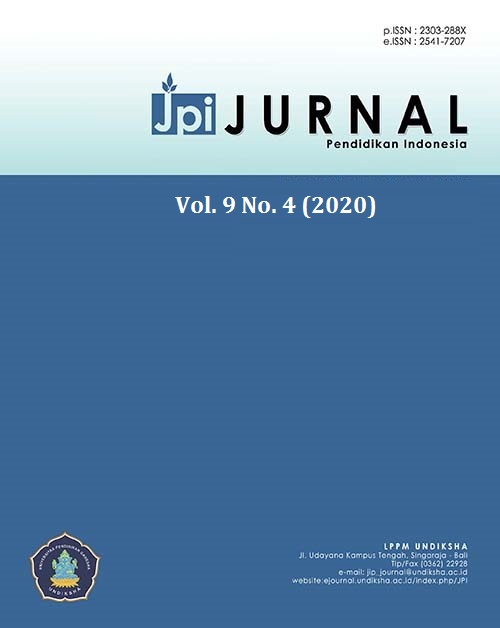Vygotsky’s Zone Of Proximal Development and The Students’ Progress in Learning (A Heutagogcal Bibliographical Review)
DOI:
https://doi.org/10.23887/jpi-undiksha.v9i4.29915Keywords:
Vygotsky’s Theory, Zone of Proximal Development, Heutagogy, Sudents as Agent of LearningAbstract
Inspired by the belief that Man’s power to change himself, that is, to learn, is perhaps the most impressive thing about him, the present study employs a library research with annotated bibliography to highlight the heutatgogical philosophy behind Vygotsky’s concept of Zone of Proximal Development. It is argued that the students’ learning progress results from the students’ personal experience, in which the students learn actively, establishing the students as the agents of learning. With this concept, it is believed that the students’ independent learning process can deliver them to the next level of their respective zone of potential development, from which process the zone of potential development will become the students’ zone of actual development, through which the students will enter their next zone of potential development, and so forth. This Heutatogical thinking is founded on the basic premise that (1) learning is centered and determined by the students, (2) the students’ capability in applying relevant skills in familiar and unfamiliar conditions, (3) the students’ reflective and metacognitive process, (4) multiple repetitions, and (5) non-linear learning. Learning process in Vygotsky’s concept Zone of Proximal Development can be applied in Heutatogical thinking through (1) the settlement of learning contract, (2) improving the learning activities, and (3) learning assessment with heutatogical deisgns, namely exploration, creation, collaboration, connection, sharing, and reflection. However, it is important to highlight in the implementation of this Vygotskian Heutogogical learning is that the students’ backgrounds and characteristics should be closely observed, with a close monitoring of the possible conflicts occurring during the learning process as they develop their sense of responsibility as they conduct their independent learning collaboratively, which might be novel for students accustomed with conventional learning.
References
A, Doni Koesoema. 2007. Pendidikan Karakter: Mendidik Anak di Zaman Global. Jakarta: Grasindo.
Arends, R.I. (2008). Learning to Teach. Yogyakarta : Pustaka Pelajar.
Canning, Natalie (2010). Playing with heutagogy: Exploring strategies to empower mature learners in higher education. Journal of Further and Higher Education, 34(1) pp. 59–71.
Creswell, John W. (2010). Research Design Pendekatan Kualitatif, Kuantitatif, dan Mixed. Yogyakarta. Pustaka Pelajar.
Hase, S., & Kenyon, C. (2000). From Andragogy to Heutagogy. Ultibase Articles, 5, 1-10.
Hase, S. (2016). Self-determined Learning (heutagogy): Where Have We Come Since 2000?. Article . Retrieved on 27th June 2020 from: https://www.researchgate.net/publication/305778049
Margaret E. Bell Gredler. 1986. Learning And Instruction Theory Into Practice “Second Edition”. New York: Macmillan Publishing Company.
Ormrod, E. (2008). Psikologi Pendidikan (Membantu Siswa Tumbuh dan Berkembang). Jakarta : Erlangga.
Sadulloh, U. (2007). Pedagogik. Bandung : Alfabeta.
Schunk.(2012). Learning Theories An Educational Perspective. Yogyakarta : Pustaka Pelajar.
Slavin, R. (2010). Cooperative Learning. Jakarta : Nusamedia Alfabeta
Suprijono, A.(2009). Cooperative Learning Teori & Aplikasi PAIKEM. Yogyakarta : Pustaka Pelajar.
Sukadi. (2006). Pendidikan IPS Sebagai Rekonstruksi Pengalaman Budaya Berbasis Ideologi Tri Hitha Karana (Studi Etnografi tentang Pengaruh Masyarakat terhadap Program Pendidikan IPS pada SMU Negeri 1 Ubud-Bali) . Desertasi. Bandug: Universitas Pendidikan Indonesia.
Schunk.(2012). Learning Theories An Educational Perspective. Yogyakarta :Pustaka Pelajar.
Vincent Gaspersz. (2019) Heutagogy (Self-Determined Learning): Membangunkan Raksasa Tidur dalam Diri. Diakses dari Radar NT. https://radarntt.co/opini/2019/heutagogy-self-determined-learning-membangunkan-raksasa-tidur-dalam-diri/ Pada 2 Agustus 2020 .
Warsono & Hariyanto. (2012). Pembelajaran Aktif Teori dan Assesmen. Bandung : Rosda
Waras Kamdi (218). Pendidikan Tinggi 4.0 (Kompas) di akses dari : https://kompas.id/baca/opini/2018/03/03/pendidikan-tinggi-4-0/ pada 2 Agustus 2020.
Downloads
Published
Issue
Section
License
Authors who publish with the Jurnal Pendidikan Indnesia agree to the following terms:
- Authors retain copyright and grant the journal the right of first publication with the work simultaneously licensed under a Creative Commons Attribution License (CC BY-SA 4.0) that allows others to share the work with an acknowledgment of the work's authorship and initial publication in this journal.
- Authors are able to enter into separate, additional contractual arrangements for the non-exclusive distribution of the journal's published version of the work (e.g., post it to an institutional repository or publish it in a book), with an acknowledgment of its initial publication in this journal.
- Authors are permitted and encouraged to post their work online (e.g., in institutional repositories or on their website) prior to and during the submission process, as it can lead to productive exchanges, as well as earlier and greater citation of published work. (See The Effect of Open Access)








